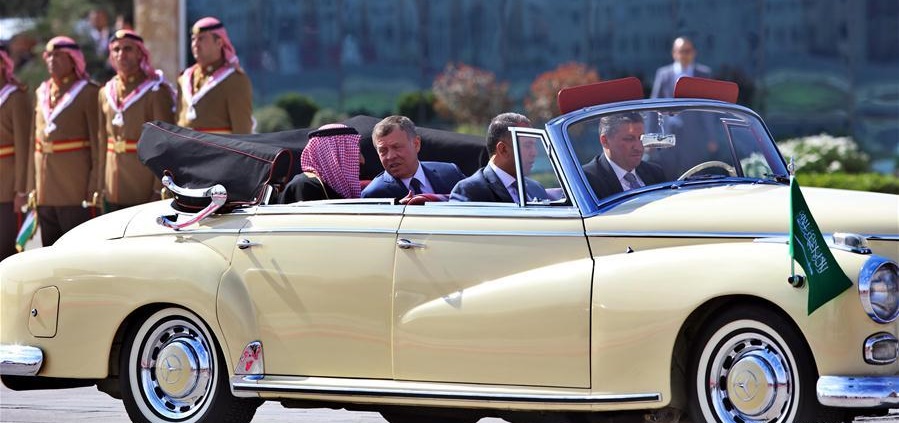Alwaght- Sources at Jordan's parliament have reported that the speaker of Jordanian House of the Representatives Atef Tarawneh is completing arrangements for a high-ranking delegation visit to Tehran. The same sources have added that the visit to Iran will be soon made.
The visit will see the Jordanian diplomats meeting the Iranian officials and discussing boost of cooperation between the two countries.
Recently, Iran’s ambassador to Jordan Mojtaba Ferdosipour and the Syrian chargé d'affaires in Amman separately met with the Jordanian parliament’s speaker. The meeting is read as opening the door to the closeness of Jordan to Iran.
Jordan shifts
The Jordanian relationship with the Islamic Republic has never been as warm and close as today. In the regional categorization, Jordan falls into a category of conservative Arab states, and apparently close to the West. Beside Tunisia and Egypt, Jordan is the only Arab state to have embassy and diplomatic missions in the Israeli regime, features making it off the Axis of Resistance which is led by Iran and includes Syria, Lebanon’s Hezbollah, and other regional actors.
However, recently, the Jordanian leaders have begun to shift the course of their foreign policy in tune with Iran, amid a tendency to separate way from the conservative Arab regimes allied with the US.
The planned Tehran visit is not the only signal of Iran-Jordan's increasingly warm relations. When in early December last year the American President Donald Trump recognized al-Quds (Jerusalem) as the capital of the Israeli regime and ordered American embassy relocation, Jordan stood out as a leading party rejecting the American leader’s move. In late December, the United Nations General Assembly passed a resolution rejecting Washington's recognition. The resolution was first in years to show an overwhelming international consensus in the face of the US and the Israeli regime. Jordan was one of the proposers of the resilution. The country also attended the Istanbul-hosted pro-al-Quds emergency meeting of the Organization of Islamic Cooperation with its highest political level, unlike Saudi Arabia which sent its lowest-level delegation.
Worrisome Jordan stances
Jordan’s alteration of approach to the regional developments is well observable through regional reactions.
Short after word spread about Jordan speaker' Tehran visit plan, the Israeli opposition leader Issac Herzog commented on the Jordan-Israeli relations. The Israeli politician described the ties with Amman as being at their lowest level in years. Herzog was talking at a cultural conference in Rishon LeZion city. He expressed concerns over frayed Israeli-Jordan ties after a string of developments like the killing of the Jordanian protestors by the Israeli embassy security in Amman and, recently, the US recognition of Al-Quds as a replacement for Tel Aviv as the Israeli capital. The Israeli discomfort signals that Jordan is gradually reviewing its regional approaches. The Israelis know it well that any new Jordan attitude will not be in tune with those of Tel Aviv and Riyadh.
Why is Jordan shifting?
It is too early to talk about Amman's regionally influential and strategic change of stances. But the recent tactical measures like the escalation of tensions with Tel Aviv as well as sending a parliamentary delegation to Tehran to bolster cooperation with the Islamic Republic do not go without impacts on the regional developments.
Of 6.5 million Jordanian population, nearly 7 percent, or 700,000, are Palestinian refugees. So, Jordan naturally finds itself more responsible to take stronger stances on the Palestinian-related events than the conservative Arab states like Saudi Arabia and the UAE.
On the other side, since assumption of power in Saudi Arabia by Mohammed bin Salman as a crown prince, the Saudi-Jordanian ties lost their past warmth. Recent power shakeup inside the royal family like the sweep of the second-generation princes and detention of a set of such wealthy royals as al-Waleed bin Talal and Mutaib bin Abdullah has been key to chill in Riyadh-Amman ties. Jordan’s royal family has friendly relations with many of the now marginalized royals.
The Jordanian leaders are not close to the new line of rulers in Saudi Arabia led by Prince Mohammed. Jordan’s rulers, fearing that the same reformist trend spreads to their own country and younger claimers of power challenge the current king, are looking at the power structure transformation in Saudi Arabia pessimistically.
Besides, Saudi Arabia last month arrested a Palestinian-Jordanian billionaire during his visit to Riyadh. Sabih al-Masri, Jordan's most influential businessman and the chairman of its largest lender Arab Bank, was detained in Saudi Arabia after a business trip to Riyadh. He was close to the Jordanian ruling family. His arrest signaled how much Jordan no longer can count on its alliance with Saudi Arabia.
Perhaps it is for this reason that Mohammad Jamel Jbrein al-Dhrawi, Jordanian lawmaker and a member of the parliamentary delegation, has recently said that Jordan officially began seeking new strategic allies.



























